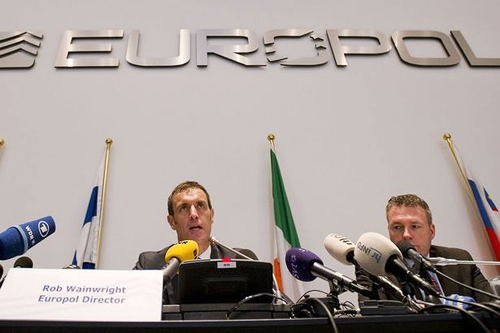
The details read like pulp fiction, filled with tales of deception and extortion and corruption. Europol’s recent revelation—that 680 soccer matches over the past four seasons were fixed by Asian crime syndicates—sounds like a story from an alternate universe. Even as we learn that everything from exhibitions to UEFA Champions League showdowns to World Cup qualifiers were supposedly predetermined by payoffs, the thought of such widespread corruption is difficult to come to terms with.
We love sports for their spontaneity. We are raised on the idea that “they don’t play games on paper,” that superior talent can be crushed by Cinderella, that any team can win on any given day. When we are confronted with a disaster on the level of the Europol investigation, or even the NBA’s officiating scandal in 2007, our first instinct is to wave it off as an anomaly. Fans are quick to assume that their sport is safe from such machinations, above reproach and safeguarded from the taint of such a deplorable affront to the purity of sport.
The truth is that every sport is susceptible to the influence of money. As the business becomes more globalized and digitalized and the revenue potential continues to increase exponentially, both the risks and the rewards become more significant. The attraction to affect the outcome of a high-stakes sporting event still exists, and the ability to affect the result of a game on the opposite side of the globe only improves with each passing day. A look back at the annals of athletic history reveals countless instances where a punter’s influence turned the result of a contest into a foregone conclusion.
The first major scandal to break out in soccer came in April of 1915, when players from Liverpool and Manchester United jointly conspired to set the final score and cash in along the way. A few years later, Chick Gandil, “Shoeless” Joe Jackson and their Chicago White Sox teammates helped fix the World Series in 1919 for the New York crime syndicate led by Arnold Rothstein. These two scandals on either side of the Atlantic were merely the first well-known cases in which fixing was proven. But with any pastime that inspired enough interest to generate a profit, there was always the chance that money might settle the score before the first whistle.
That possibility has waxed rather than waned over the century since. Boxing suffered intermittent fixes throughout its golden era (Jake LaMotta’s 1947 stoppage loss against Billy Fox being the most glaring example). The NHL saw its own series of scandals with two betting revelations coming during the decade. 1951 was a bomb-dropper of a year, as news emerged of point-shaving scandals in college basketball, a manipulation of the score lines that originated at City College of New York before spreading through the city and into the Midwest. A dozen years later, Alex Karras and Paul Hornung would be suspended by the NFL for a full season for betting on a game, precursors to the later lifetime suspension by Major League Baseball of Pete Rose for a similar offense.
Around the same time, in Europe, Hungarian fixer Dezso Solti was manipulating European Cup referees as Inter Milan won back-to-back titles in 1964 and 1965. Paying off referees before matches and even threatening their careers if they didn’t comply, Solti acted with the active direction of Inter officials. Only the scruples of referee Gyorgy Vadas, who turned down Solti’s money before officiating the Milanese leg of the 1966 European Cup semifinal, prevented Inter’s passage to a third consecutive final.
As fans, we implicitly take the action on the field of play at face value, accepting the outcome as the result of earnest effort on the part of our athletic heroes. But a century of history shows that we might be much more naive in that regard than we think. Horse racing, cricket, tennis, the Olympics—all come complete with their own stories of corruptive influences infiltrating the sanctity of their sports, a long line of tales that sound suspiciously like the intrigue detailed by Europol last week. Fans can either despair or they can deal with it, but the issue is by no means a new development, nor will it be disappearing any time soon.

